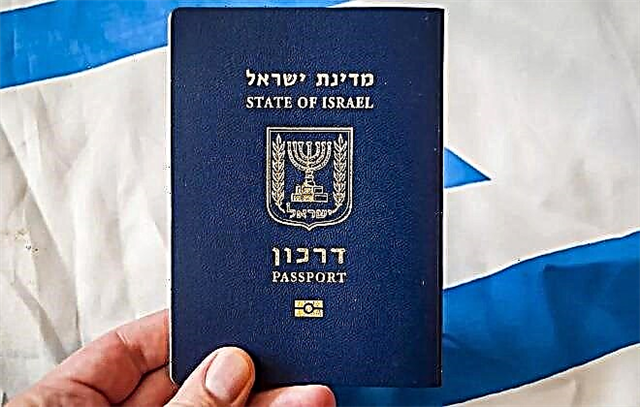Israel is a popular destination for immigration for residents of post-Soviet countries. If you have Jewish roots, it is not too difficult to move to this country. But foreigners of other nationalities can also get a residence permit in Israel.

What are the advantages of a residence permit in Israel
There is an agreement on a visa-free regime between Russia and Israel. Holders of Russian passports have the right to stay in Israel for 90 days out of each calendar six months without any paperwork.
But if they plan to spend a longer time in this country, then they must apply for a long-term visa or residence permit.
There are several options for a residence permit in Israel:
- a transitional residence permit (up to 5 years);
- temporary residence permit (up to 3 years);
- permanent residence permit (no time limit).
Residence permit holders enjoy the same rights as citizens of the country, but they do not take part in elections (local and parliamentary), cannot hold elective and some government positions.
A residence permit in Israel for Russians is not automatically granted if there is real estate or business in the country. A person officially recognized as a resident of Israel has the right to receive benefits and services from the Bituach Leumi (National Insurance Board), including the accrual of Israeli retirement experience and medical insurance. He is obliged to obey Israeli law, pay taxes and serve in the army.
Who can get a residence permit
Permits to reside in Israel are issued under the 1950 Return Law (for returnees), the 1952 Entry into Israel Law (for other categories of foreigners) or the 1991 Foreign Workers Law. But a residence permit in Israel is readily available only to ethnic Jews.
Foreigners of other nationalities can obtain the status of temporary or permanent residents of Israel if they come to work at the invitation of a company or to study at a university, as a priest of the Jewish religion or student of a religious school, volunteer or family member of an Israeli citizen.
A residence permit can be obtained by spouses of ethnic Jews (even if they themselves are not Jews), and not only official, but also civil ones.
The right to reside in the country is also granted to children (including adoptive ones) of Israeli citizens and their elderly parents.
A separate category is people who receive a residence permit for humanitarian reasons: refugees or people with serious illnesses.
Options for obtaining a residence permit
The easiest and most reliable way to obtain a temporary residence permit, and subsequently permanent residence and citizenship, is to participate in repatriation programs. But this is only available to ethnic Jews or applicants who are of Jewish descent up to the third generation.
In addition, for Halachic Jews (those who inherited Jewish blood through their mother), a prerequisite for immigration is belonging to the Jewish religion. If a person has Jewish roots on the paternal side, then an atheistic worldview is permissible for him.
For Russian citizens, the most convenient option for processing repatriation is to contact the Israeli consulate in their home country, submit documents that confirm Jewish origin, and pass an interview.

If the evidence of ethnic Jewish roots and the motives for moving to Israel are found satisfactory, the applicant receives a repatriate visa (A1), which is valid for 6 months. During this period, the applicant must come to the territory of Israel for permanent residence.
The organizational issues of accepting immigrants are handled by the Jewish Agency "Sokhnut". Repatriates are provided with free tickets for air travel to Israel and the opportunity to carry extra baggage.
After arriving in Israel, Halachic Jews-Jews become citizens of the country immediately. Applicants in other categories, who are also eligible for repatriation, receive a so-called "transitional residence permit", which is valid for 5 years. After that, they can obtain permanent residence or citizenship.
The document for the right of permanent residence in the country is issued to underage children of repatriates without intermediate stages.
It is also possible to apply for the status of a repatriate at the Israeli Foreign Ministry, but for this you need to be in Israel permanently, and checks can take quite a long time.
In case of an officially registered marriage with an Israeli citizen or holder of permanent residence status in Israel, foreigners receive a temporary residence and work permit in the country for 1 year. Within 5 years, the permit can be renewed, after which the right to permanent residence can be obtained.
Similar conditions have been created for those who are in a civil marriage, but this process will take 7 years. In addition, the reality of the conjugal union will be regularly checked by the relevant services.
If an Israeli citizen has elderly parents living in another country, he can take them to Israel and issue them a residence permit. But this can only be done if the mother is at least 65 years old and the father is at least 67 years old, and they have no other children outside Israel.
There are other options for obtaining a residence permit in Israel. For example, a person can come to the country as a student (on an A2 visa), a priest (on an A3 visa), or for work (on a B1 visa).
If a visitor has been living in Israel on a long-term visa for more than 183 days and has declared his intention to live in the country, as well as took practical steps to improve his everyday life (bought real estate, enrolled children in school, etc.), he can obtain official status of a resident of Israel.
Having lived in the country for 4 years with a temporary residence permit, you can apply for permanent residence.
Document packages
The documents that must be submitted to obtain a residence permit in Israel depend on which category of applicants you belong to.
Repatriates of Jewish origin and their family members must present:
- Any documents that confirm the nationality of the applicant and his direct relatives up to the third generation (passports or birth certificates, certificates, extracts from house books or archival documents, confirmation from a rabbi, family photos, certificates of burial in a Jewish cemetery).
- Civil status documents (birth certificates, marriage certificates, divorce certificates, etc.).
- Internal passports.
- Military cards, originals or copies of work books.
- Documents about the existing education (certificates, diplomas).
- Foreign passports.
- Photos of 3x4 cm.
- Certificate of no criminal record (on demand).
- Information about relatives living in Israel (if any).
It is recommended to start the procedure for registration of the status of a repatriate 6 months before the expected time of departure.

Applicants in other categories will need:
- Application to the consulate for a long-term visa.
- Civil and foreign passports (originals and copies).
- Two passport-size photographs.
- Receipt of payment of the duty.
- For going to work: police clearance certificate, medical certificate, biometrics certificate (fingerprinting and biometric photography).
- For students: a certificate of admission to study, issued by an Israeli university, and confirmation of the availability of funds to pay for tuition and residence in the country.
- For clergymen - a document confirming their religious status.
A residence permit in Israel for non-Jews is issued in 1-3 months.
Israeli citizenship
Citizenship of Israel can be obtained by:
- children from a Jewish mother (Halachic Jews);
- children and grandchildren of Jews;
- legal spouses of Jews;
- widowers and widows of Jews (if they did not later marry non-Jews);
- people professing Judaism (regardless of nationality).
The great-grandchildren of Jews cannot become citizens of Israel, but it is not difficult for them to obtain permanent residence status.
Natives of Russia are allowed to have dual citizenship - Russian and Israeli. After obtaining Israeli citizenship, income earned outside this country is tax-free for 10 years.
The foreign passport of an Israeli citizen (darkon) allows you to travel without visas to more than 150 countries of the world, including Canada and the United Kingdom, as well as obtain a visa to the United States for 10 years.
Refusal to apply for a residence permit
The applicant may not receive a permit for repatriation or residence permit in Israel due to many factors.
The most common reasons for denying foreigners to repatriate and enter the country:
- Inability to reliably prove Jewish origin.
- Change of religion (for the Halachic Jew).
- Having a criminal record.
- The presence of mental illness.
- Various non-standard situations related to origin: birth out of wedlock, adoption.
- Incomplete set of documents.
The refusal can be challenged by filing a lawsuit with the Israeli Supreme Court.
Life in Israel
Living conditions in Israel for immigrants from Russia can be difficult. Summer is very hot for people accustomed to temperate climates. Military operations are taking place on the borders of some regions of the country, besides, it is not always easy for visitors to adapt to new conditions and language.
Life in Israel is quite expensive, the prices for everything are high, and a lot of work is needed to ensure a decent standard of living.
Most of the Russian-speaking people who came during the period of mass immigration of the 90s live in Tel Aviv, its suburb of Bat Yam and Haifa, where it is quite easy to find a job.
Young people who are attracted by the idea of social equality and life in nature can get a job in a kibbutz: these communes accept men and women under 35 years old.
Many immigrants from Russia work in the tourism business in coastal cities - Eilat, Haifa and others.
Conclusion
There are various options for obtaining a residence permit in Israel for a Russian citizen. The choice depends on whether the applicant has Jewish roots. If not, it will not be easy to obtain a permanent residence permit in the country, but under certain conditions it is possible.











